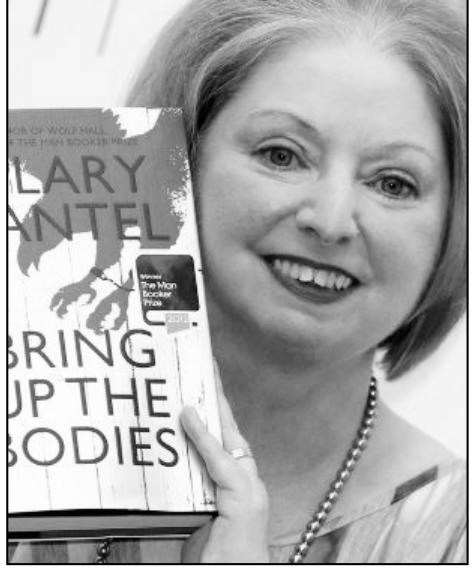Hilary Mantel wrote herself into the history books on Tuesday, becoming the first woman and first Briton to win the coveted Man Booker prize for fiction twice with Bring Up the Bodies, the sequel to her acclaimed Wolf Hall.
Two men had previously "done the double" - J.M. Coetzee, who was born in South Africa, and Australia's Peter Carey.
Chairman of judges Peter Stothard described Mantel as the "greatest modern English prose writer," and told reporters she had rewritten the art of historical fiction.
Wolf Hall, her re-imagining of the rise of blacksmith's son Thomas Cromwell to the top of the court of King Henry VIII, won the 50,000 pound ($80,000) prize in 2009.
Bring Up the Bodies, published by HarperCollins imprint Fourth Estate, picks up the action in 1535 with Anne Boleyn's spectacular fall from grace and execution the following year.
"This is a bloody story of the death of Anne Boleyn and the pursuit of Anne Boleyn, but Hilary Mantel is a writer who thinks through the blood," Stothard said. "She uses her power of prose to create moral ambiguity and the real uncertainty about political life then."
The final part of Mantel's epic trilogy, called The Mirror and the Light, is expected to hit shelves in 2015.
Stothard, editor of the Times Literary Supplement, likened the character of Cromwell to Don Corleone of the famous Godfather film series.
"If you are looking for comparing it with things, you can see as much Don Corleone in this book as D.H. Lawrence," he said in the medieval splendour of London's Guildhall, where the prize was announced at a glitzy dinner.
Stothard, who sought to impose rigorous literary criticism on the judging process this year, said Bring up the Bodies had surpassed Wolf Hall, calling it "tighter."
Stothard prevented the five-member panel from taking the decision to a vote, saying the winning novel was the one for which the arguments in favour proved strongest.
"We have never had a vote at any point in our long discussions," he explained. "I don't believe that art can be reduced to numbers."
Also on the shortlist this year, and joint favourite, was Will Self's Umbrella, a modernist tale about a woman who falls into a coma at the end of the First World War, only to be awakened decades later.



